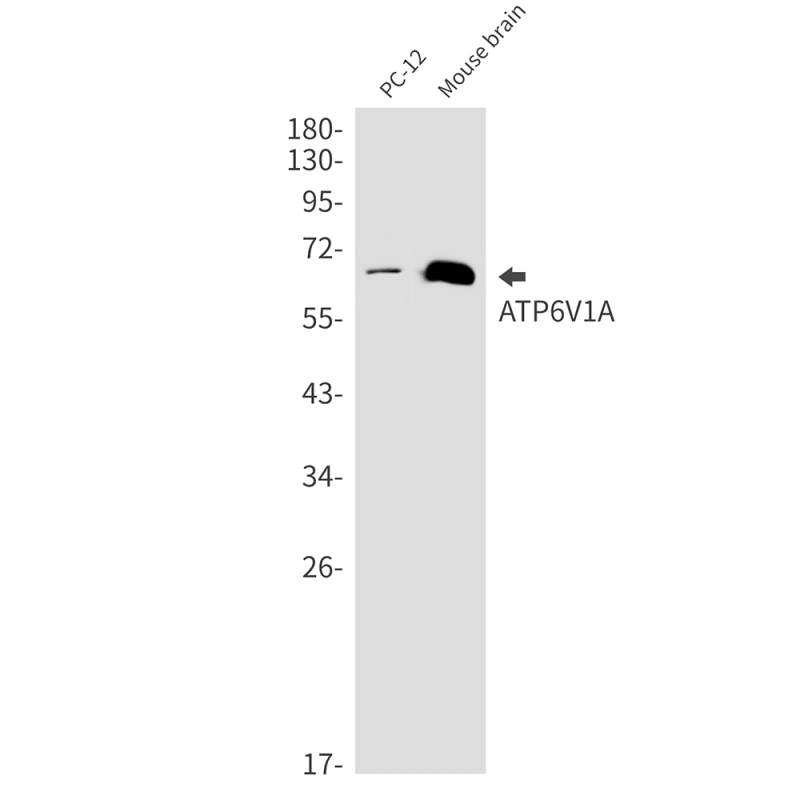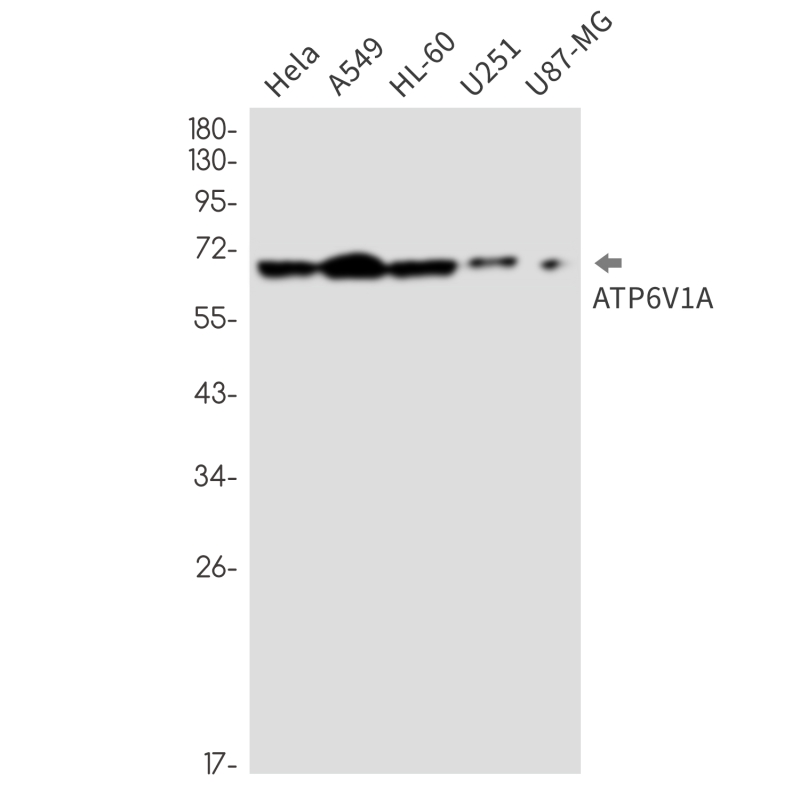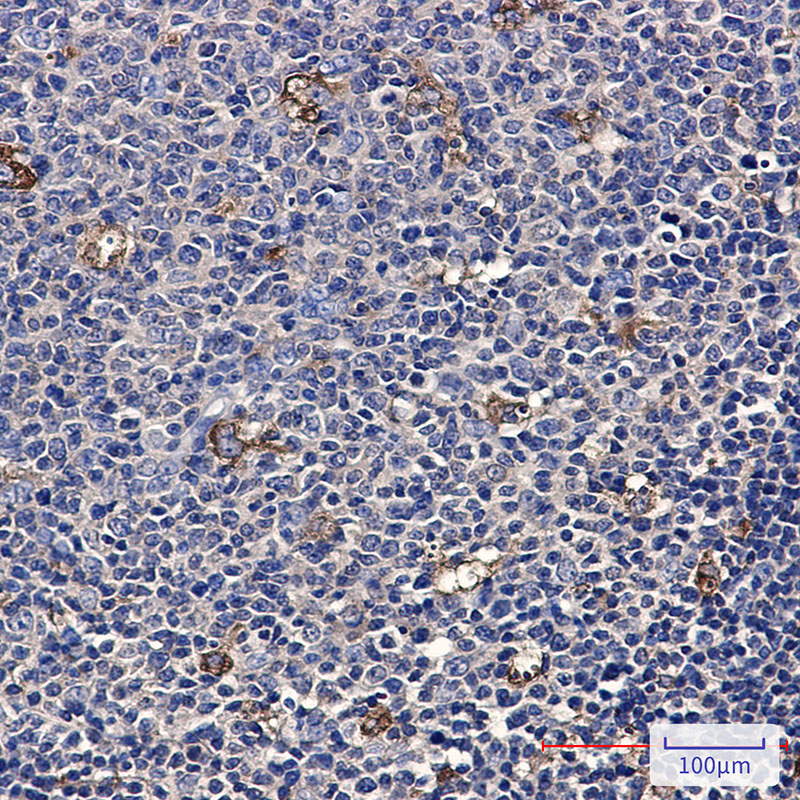


| WB | 1/500-1/1000 | Human,Mouse,Rat |
| IF | 1/20 | Human,Mouse,Rat |
| IHC | 1/50-1/100 | Human,Mouse,Rat |
| ICC | 技术咨询 | Human,Mouse,Rat |
| FCM | 咨询技术 | Human,Mouse,Rat |
| Elisa | 咨询技术 | Human,Mouse,Rat |
| Aliases | HO68; VA68; VPP2; Vma1; ARCL2D; ATP6A1; IECEE3; ATP6V1A1 |
| Entrez GeneID | 523 |
| WB Predicted band size | Calculated MW: 68 kDa; Observed MW: 68 kDa |
| Host/Isotype | Rabbit IgG |
| Antibody Type | Primary antibody |
| Storage | Store at 4°C short term. Aliquot and store at -20°C long term. Avoid freeze/thaw cycles. |
| Species Reactivity | Human,Mouse,Rat |
| Immunogen | Recombinant protein of human ATP6V1A |
| Formulation | Purified antibody in TBS with 0.05% sodium azide,0.05%BSA and 50% glycerol. |
+ +
以下是关于ATP6V1A抗体的3篇代表性文献,涵盖其在不同研究中的应用及发现:
1. **文献名称**:*ATP6V1A mutations impair V-ATPase function and cause autosomal recessive congenital cerebellar atrophy*
**作者**:Kornak U, et al.
**摘要**:该研究通过免疫印迹(Western blot)和免疫荧光技术,利用ATP6V1A抗体发现基因突变导致V-ATP酶复合体功能缺陷,进而引发小脑萎缩和神经发育障碍,揭示了ATP6V1A在中枢神经系统中的关键作用。
2. **文献名称**:*Role of V-ATPase in tumor cell invasion and pH regulation*
**作者**:Forgac M, et al.
**摘要**:研究使用ATP6V1A抗体分析肿瘤细胞中V-ATP酶的亚细胞定位及表达水平,发现其通过酸化微环境促进肿瘤侵袭,为靶向V-ATP酶的抗癌治疗提供了依据。
3. **文献名称**:*Generation and characterization of a monoclonal ATP6V1A antibody for lysosomal disorders*
**作者**:Smith C, et al.
**摘要**:本文报道了一种高特异性ATP6V1A单克隆抗体的开发,验证了其在溶酶体贮积症患者细胞中的诊断应用,证实该抗体可有效检测蛋白表达异常。
这些文献展示了ATP6V1A抗体在疾病机制研究、癌症生物学及诊断工具开发中的多样化应用。如需更多文献,可进一步限定研究领域或年份。
The ATP6V1A antibody targets the ATP6V1A protein, a critical subunit of the vacuolar-type H+-ATPase (V-ATPase), a multisubunit enzyme responsible for acidifying intracellular compartments like lysosomes, endosomes, and secretory vesicles. V-ATPases hydrolyze ATP to pump protons across membranes, maintaining organelle pH and enabling processes such as protein degradation, neurotransmitter release, and cellular homeostasis. The ATP6V1A subunit resides in the V1 domain, which catalyzes ATP hydrolysis, distinguishing it from the membrane-bound V0 domain involved in proton translocation.
Antibodies against ATP6V1A are widely used in research to study V-ATPase assembly, localization, and function. They help investigate its role in diseases linked to pH dysregulation, including cancer (e.g., tumor metastasis via extracellular acidification), neurodegenerative disorders (impaired lysosomal activity), and renal tubular acidosis (defective proton secretion). These antibodies are validated for techniques like Western blotting, immunohistochemistry, and immunofluorescence to assess protein expression, tissue distribution, and subcellular localization. Researchers also utilize ATP6V1A antibodies to explore therapeutic targeting of V-ATPases in drug-resistant cancers or autoimmune conditions. Specificity and validation data (e.g., knockout controls) are essential for interpreting results, given the structural complexity of V-ATPases and potential cross-reactivity with homologous subunits. Overall, ATP6V1A antibodies serve as vital tools for unraveling the enzyme's physiological and pathological mechanisms.
×